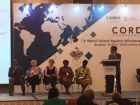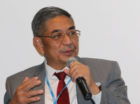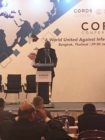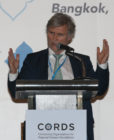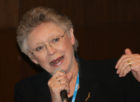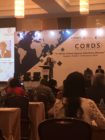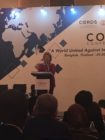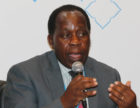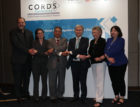Conference Bangkok 2018
CORDS 2018 Conference
29, 30 January 2018, Bangkok, Thailand
Connecting Organisations for Regional Disease Surveillance (CORDS), The Rockefeller Foundation, and Ending Pandemics (formerly Skoll Global Threats Fund) held a conference in Bangkok, Thailand on the 29th and 30th January 2018. The event, a side meeting of the Prince Mahidol Award Conference, was held at the Centara Grand & Bangkok Convention Centre at CentralWorld.
CORDS is a global initiative that works to catalyze collaboration among regional disease surveillance networks across the world in order to improve their capacity to prevent, detect, and control the spread of epidemics. Our vision is a world united against disease. CORDS is comprised of six international networks which include: the Asia Partnership on Emerging Infectious Diseases Research (APEIR), the East African Integrated Disease Surveillance Network (EAIDSNet), the Mekong Basin Disease Surveillance Consortium (MBDS), the Middle East Consortium on Infectious Disease Surveillance (MECIDS),
the Southern African Centre for Infectious Disease Surveillance (SACIDS), and the Southeast European Center for Surveillance and Control of Infectious Diseases (SECID). The two-day CORDS Conference was an integral component of PMAC 2018, reinforcing the overarching theme “Making the World Safe from the Threats of Emerging Infectious Diseases.” Under the specific topic “Advancing Regional Collaboration for Improved Global Health Security”, the conference brought together 173 participants from 45 countries and 5 continents, with 10 regional networks represented.
Over the two days there were four sessions following CORDS strategic objectives: i) Building capacity; ii) Promoting Innovation; iii) Advancing One Health; and iv) Building sustainable networks.



CORDS Conference
Poster Session
Press Conference and Welcome Dinner
Partners
We are grateful to our partners for their generous support.
The Rockefeller Foundation
For more than 100 years, the Rockefeller Foundation has brought people together to try to solve the world’s most challenging problems and promote the well-being of humanity. The Rockefeller Foundation supports work that fights to secure the fundamentals of human well-being – health, food, energy, jobs – so that they’re within reach for everyone, everywhere in the world. Today, its portfolio of work in health includes support for Planetary Health, Universal Health Coverage, and Disease Surveillance Networks, with the goal of ending millions of preventable
deaths through more equitable, effective health systems in communities around the world.
Ending Pandemics
In December 2017, The Skoll Global Threats Fund Board of Directors spun out Ending Pandemics as an independent entity focused on eliminating this global threat to humanity. Ending Pandemics works with partners across the globe to unlock the potential to find, verify, and respond to outbreaks faster no matter where they might emerge on the planet.
Fondation Merieux
For over 50 years Mérieux Foundation, an independent family foundation with public interest status, has worked on the ground with local partners to improve the living conditions for mothers and children, and build the infrastructure and knowledge that underpin the surveillance and control of infectious diseases in developing countries. Mérieux Foundation is active today in over twenty countries.
Agenda
The Conference covers four topics, Promoting Innovation, Advancing One Health, Network Capacity Building and Building Sustainable Networks.
| Time | Theme | Speakers |
| 8:30 – 9:00 | Registration | |
| 9:00 – 9:05 | Welcome Addresses | Dr. Christophe Longuet, Executive Director CORDS Prof. Amin Soebandrio, Chairman CORDS |
| 9:05 – 9:15 | Keynote Address I | Prof. Charlanne Burke, Associate Director The Rockefeller Foundation |
| 9:15 – 9:25 | Keynote Address II | Prof. Larry Brilliant, Chair of the Board, Ending Pandemics |
| 9:25 -9:40 | Special Lecture: Lessons learned from HIV for the Next Pandemic | Prof. Francoise Barré Sinoussi, Nobel Laureate, Institut Pasteur Paris |
| Session 1: Promoting Innovation Chair: Prof. Julius Lutwama, EAIDSNet Co-Chair: Mr Sari Husseini, MECIDS |
||
| 9:45 – 10:00 | Lecture: Promoting Innovation for Efficient Healthcare Systems | Prof. Itamar Grotto, Israeli Ministry of Health |
| 10:00 – 10:45 | Panel: Innovation in Disease Surveillance | Innovative Tools for Event Detection, Prof. Ann Marie Kimball, Chatham House
The WHO Health Emergencies Programme: Platforms and Systems to Manage Public Health Risks and Emergency Events, Dr. Oliver Morgan, WHO Ending Pandemics, Dr. Mark Smolinski, Ending Pandemics |
| 10:45 – 11:15 | Coffee break & Poster session | |
| 11:15 – 12:15 | Panel: Innovation in Disease Surveillance Using a Digital Approach | Innovative tools and approaches for surveillance in animal health, Dr. Julio Pinto, FAO
East Africa Public Health Laboratory Networking project strengthens disease surveillance using regional web based reporting system, Dr. Benedict Mushi, EAPHLN Using smart phones occupied with intelligent mobile & web apps for electronic system of disease surveillance in Tanzania, Mr Eric Beda, SACIDS Inter-sectoral and inter-network collaboration for improving disease surveillance in East & Southern Africa, Open discussion |
| 12:15 – 13:00 | Panel: Improving Laboratory-Based Disease Surveillance | Building capacities for influenza surveillance in the Republic of Macedonia (2014-2017), Dr. Vladimir Mikikj, SECID
Genomic profiling of multidrug resistance tuberculosis among patients in Tanzania, Dr. Bugwesa Katale, SACIDS Seroepidemiological study to identify Middle East Respiratory Syndrome Corona Virus (MERS-coV) transmission in Jordan, Israel and Palestinian Authority, Open discussion |
| 13:00 – 14:00 | Lunch break & Poster session | |
| Session 2: Advancing One Health Chair: Prof. Mark Rweyemamu, SACIDS Co-Chair: Prof. Nguyen Dang Vung, MBDS |
||
| 14:00 – 14:15 | Lecture: Emerging Infections: Interventions from a One Health Perspective | Prof. Ab Osterhaus, Center of Infection Medicine and Zoonosis Research at Hannover Veterinary University |
| 14:15 – 15:05 | Panel: Making One Health Surveillance Work | Pan African network for rapid research, response, relief and preparedness for infectious disease epidemics (PANDORA), Dr. Willy Were, EAIDSNet/SACIDSEstimating the economic and social consequences for patients diagnosed with human African Trypanosomiasis in Muchinga, Lusaka and Easter provinces of Zambia (2004-2014), Dr. Martin Simuunza, SACIDSGap analysis of a neglected global disease of marginalized people ‘leishmaniasis’, Jordan, Albania and Pakistan (2015), Prof. Silvia Bino, SECID Open discussion |
| 15:05 – 15:30 | Coffee break & Poster session | |
| 15:30 – 16:50 | Panel: Addressing Antimicrobial Resistance Using the One Health Approach
|
Antibiotic use and antimicrobial resistance, Dr. Jorge Pinto Ferreira, OIE The SACIDS One Health approach to genomics driven surveillance for antimicrobial resistance – a potential collaboration with EAIDSNet, Dr. Stephen Mshana, SACIDSAntimicrobial resistance in Macedonia compared with Balkan region and Europe: Results of CAESAR network, Prof. Golubinka Bosevska, SECIDStrengthening regional role in EID research: APEIR experience, Prof. Wiku Adisasmito, APEIRThe Fleming Fund One Health Programme on AMR Dr. Toby Leslie, Mott MacDonald Open discussion |
| 16:50 -17:00 | Wrap-up of day 1 | |
TIME |
THEME |
SPEAKERS |
|
SESSION3: Network Capacity Building
|
|||
| 9:00 – 9:15 | Lecture: Africa Centers for Diseases Control and Prevention: An Opportunity to Strengthen Public Health Networks on the Continent | Dr. John Nkengasong, Africa CDC | |
| 9:15 – 10:15 | Panel: Building Capacity in the Regions | National Public Health Institutes as the frontline of Global Health Security, Dr Chikwe Ihekweazu, Nigeria CDC
Operational research project management experiences, challenges and lessons learned in East Africa Public Health Laboratories networking project, Dr Mary Karimi, EAIDSNet Reproducibility of results and performance of TB diagnostics in East Africa Public Health Networking Project in Kenya, The Australian government ‘s new Health Security Initiative for the Indo-Pacific Region, Ms Madeleine Moss, Indo-Pacific Centre for Health Security and JEE Alliance Open discussion |
|
| 10:15 – 10:45 | Coffee Break & Poster session | ||
| 10:50 –12:00 | Panel: Building Capacity in the Regions (Cont’d) | A network to enhance regional cross-border collaboration on health-related issues, Dr. Sovann Ly, MBDS
Mediterranean Programme for Intervention Epidemiology Training as an approach to addressing international health risks in the Mediterranean region, Dr Gordana Kuzmanovska, SECID The process of evaluating timeliness of outbreak detection and response in Southeast European Region, Dr Kujtim Mersini, SECID Influenza Season 2016-2017 in Serbia, sentinel surveillance of severe acute respiratory infection, Dr Dragana Dimitrijevic, SECID Canada’s priorities to mitigate global biological threats, Dr Robert Clarke, Canada’s Global Partnership Program Open discussion |
|
| 12:00 – 12:30 | Poster session | ||
| 12:30 – 14:00 | Lunch Break | ||
SESSION 4: Building Sustainable Networks
|
|||
| 14:00 – 14:15 | Lecture: Building Sustainable Networks to achieve CORDS’ vision and mission | Prof Suwit Wibulpolprasert, International Health Policy Program Foundation and Ministry of Public Health Thailand | |
|
14:15 – 15:05
|
Panel: Network Experiences | Sustaining and strengthening capacity of regional networks and partnership to respond to emerging infectious diseases in Asia, Prof Wiku Adisasmito, APEIR
Evolution of MBDS network and the regional importance of collaboration, Dr Moe Ko Oo, MBDS The Evolution of SACIDS from concept towards a sustainable structure, Prof Gerald Misinzo, SACIDS Open discussion |
|
| 15:05 –15:30 | Coffee Break & Poster session | ||
| 15:30 –16:50 | Panel: Network Experiences (Cont’d) | Strengthening communicable disease response in South East Europe through regional networking and establishing a regional development center, Prof Silvia Bino, SECID
Tracking inter-country transmission of Salmonella Infantis using the laboratory-based surveillance network established by MECIDS, Dr Ravit Bassal, MECIDS The role of EMPHNET in responding to public health challenges in the Eastern Mediterranean Region, Dr Mohannad Al-Nsour, EMPHNET Building sustainable networks: Experiences and challenges of EAIDSNET, Prof Julius Lutwama, EAIDSNET Building sustainable laboratory networks, Mr Benoit Miribel, Fondation Mérieux Developing a regional surveillance network in West Africa, Dr Bakary Sylla, CORDS Establishing One Health Disease Surveillance Network: A recent convergence in South Asia, Prof Sithar Dorjee, Khesar Gyalpo University of Medical Sciences of Bhutan Open discussion |
|
| 16:50 – 17:00 | Conference Closing Remarks | Dr Christophe Longuet, CORDS Prof Amin Soebandrio, Chairman, CORDS |
|



